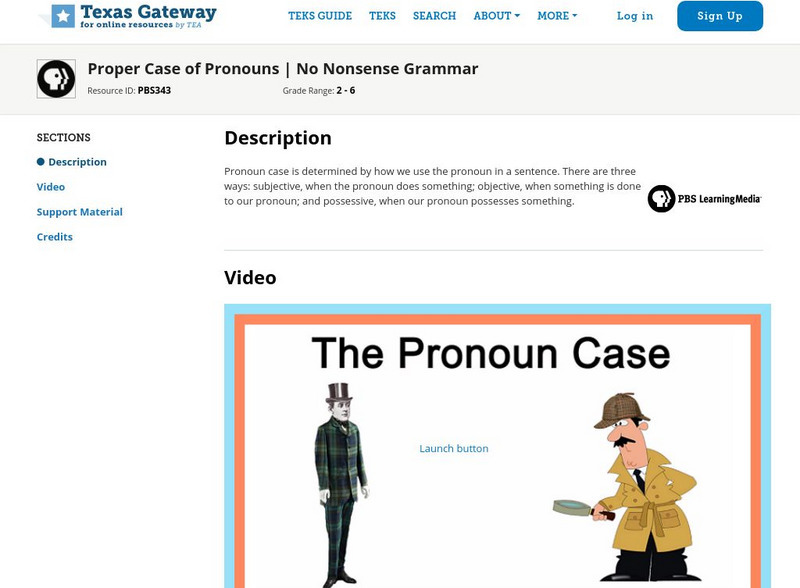Hi, what do you want to do?
Study Languages
Study Spanish: Subject Pronouns
After a brief review of what verbs and verb infinites are, this site offers a comprehensive explanation of subject pronouns. A great comparison of Spanish subject pronouns to English subject pronouns. Differences between second person...
University of Texas at Austin
Tex's French Grammar: Subject Pronouns
This resource provides an explanation of subject pronouns with interactive practice exercises. Includes audio.
University College London
University College London: Subjective Pronouns
Short explanation of subjective pronouns. Includes example sentences of correct and incorrect usage.
Texas Education Agency
Texas Gateway: Proper Case of Pronouns | No Nonsense Grammar
Pronoun case is determined by how we use the pronoun in a sentence. There are three ways: subjective, when the pronoun does something; objective, when something is done to our pronoun; and possessive, when our pronoun possesses something.
Study Languages
Study Spanish: Pronouns as Objects of Prepositions
This site is an explanation of prepositional pronouns with a list of prepositions that only take subject pronouns. Great lesson for understanding prepositional pronouns. Learners may check test their mastery of this principle with a quiz...
Towson University
Towson University: Online Writing Support: Pronouns
This entry focuses on the kinds of pronouns including personal, relative, indefinite, demonstrative, interrogative, reflexive/intensive, and singular and plural pronouns. It provides an explanation and examples of each.
Texas Education Agency
Texas Gateway: Editing for Subject Verb Agreement
This lesson will provide some tips about how to locate and correct agreement problems; then students will have a chance to practice their skills and feel more confident about writing sentences with subjects and verbs that agree.
SMART Technologies
Smart: Subject Pronouns
Students will identify subject pronouns using a graphic organizer in this SMART whiteboard activity. Students will then use the keyboard to choose the appropriate subject pronoun.
Curated OER
Mc Graw Hill: Language: Pronouns
Learn how to use the varying different types of pronouns in this excercise.
Study Languages
Study Spanish: Direct Object Pronouns Part Ii
This site has an introduction to the concept of direct objects and their pronouns, that focuses on their use in affirmative and negative sentences. Ample examples illustrate the formation and placement of direct object pronouns. Young...
Study Languages
Study Spanish: Direct Object Pronouns Part I
This site is an introduction to the concept of direct objects and their pronouns. Ample examples illustrate the formation and placement of direct object pronouns. Young scholars may check their mastery of this principle with a quiz that...
Study Languages
Study Spanish: Direct Object Pronouns Part Iii
This site has an introduction to the concept of direct objects and their pronouns, that focuses on their use in sentences with verb infinitives. Ample examples illustrate the formation and placement of direct object pronouns. Students...
Study Languages
Study Spanish: Indirect Object Pronouns Part Ii
This website is a lesson on indirect objects and their pronouns. Good explanation of their use in negative sentences. Ample examples illustrate the formation and placement of indirect object pronouns. Students may check their mastery of...
Study Languages
Study Spanish: Indirect Object Pronouns Part I
This site is an introduction to the concept of indirect objects and their pronouns. Ample examples illustrate the formation and placement of indirect object pronouns.Students may check their mastery of this principle with a quiz that...
Study Languages
Study Spanish: Indirect Object Pronouns Part Iii
Online lesson on indirect objects and their pronouns. Good explanation of their use in sentences that include verb infinitives. Ample examples illustrate the formation and placement of indirect object pronouns. Young scholars may check...
Towson University
Towson University: Subject Verb Agreement
This webpage provides a list of nine rules for subject-verb agreement including examples with detailed explanations including arrows and notes as well as exceptions to the rules. It also provides links to terms which are defined with...
Indiana University
Juan M. Soto: Reglas Indirect Object Pronouns
Concise, but thorough English explanation of indirect object pronouns in Spanish grammar. Also explains how to use direct and indirect object pronouns together.
Robin L. Simmons
Grammar Bytes: The Subject Complement
Printable information is provided that demonstrates how to identify a subject pronoun in the context of a sentence.
TES Global
Blendspace: Subjective and Objective Pronouns
A learning module that includes eighteen links to videos, activities, images, quizzes, word lists, and more that teach about subjective and objective pronouns and their use.
Fact Monster
Fact Monster: Pronouns: Subjective, Objective, Possessive, Demonstrative, Etc.
This grammatical reference shares definitions of each type of pronoun. Each category of pronoun includes several examples. The following types of pronouns are included: demonstrative pronouns, indefinite pronouns, intensive pronouns,...
PBS
Pbs Learning Media: Reflexive Pronouns and Subjects
Reflexive pronouns reflect the subject of the sentence. A reflexive pronoun is a pronoun that is preceded or followed by the noun, adjective, adverb, or pronoun to which it refers within the same clause. [0:35]
Wisc-Online
Wisc Online: Personal Pronouns
In this learning module, students read about the difference between the subject and object form of personal pronouns and test their knowledge in practice exercises.
University of Ottawa (Canada)
University of Ottawa: Using Pronouns
Clear and simple explanation of the various types of pronouns, this site is easy to read and follow.
Lumen Learning
Lumen: Grammar: Pronouns
This instructional activity focuses on pronouns including functions of pronouns, types of pronouns, pronoun person, number, and case, and pronoun and antecedent agreement and clarity. It also provides three pronoun videos, pronoun...



























